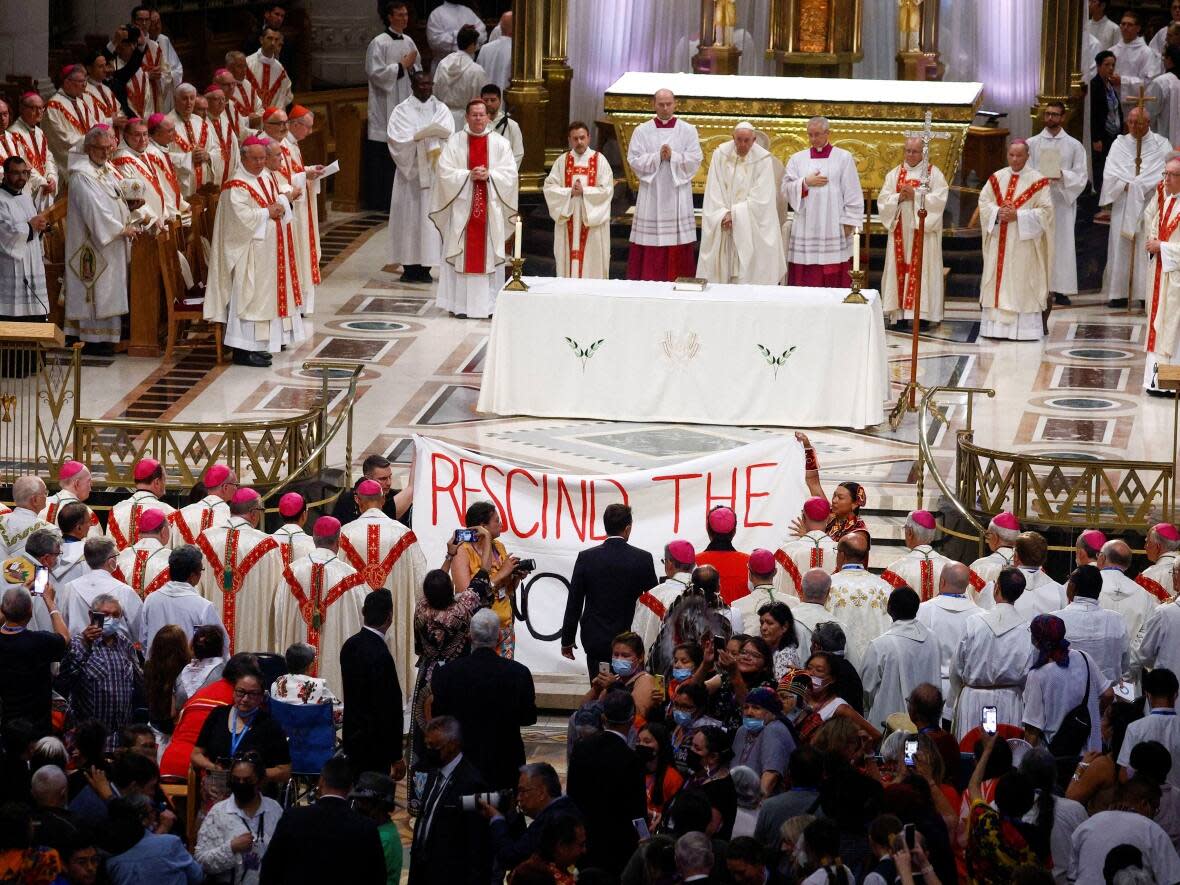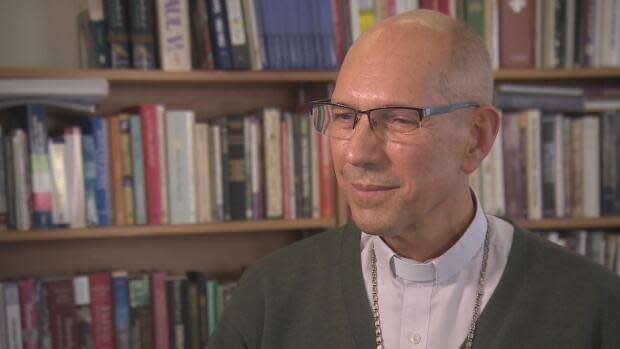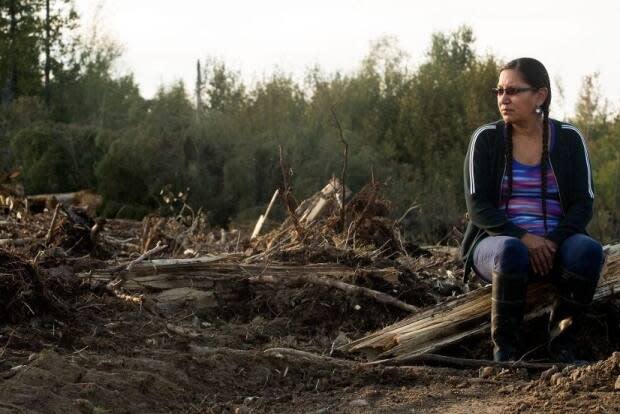Mixed feelings from Sask. Indigenous people after Catholic Church repudiates Doctrine of Discovery

Warning: this story contains distressing details.
The Vatican has formally repudiated the Doctrine of Discovery, centuries after the colonial-era concept justified the occupation of lands stewarded by Indigenous peoples.
The church's statement drew mixed reactions.
"As a [residential school] survivor, it does nothing for me because the damage has been done," said Deanna Ledoux, a mental health therapist in Saskatchewan and Alberta.
Ledoux spent nearly 10 years at the St. Michael's Indian Residential School, operated by the Roman Catholic Church near Duck Lake, Sask., about 80 kilometres northeast from Saskatoon.
The Doctrine of Discovery is a legal concept, backed by 15th-century papal bulls, that justified Europeans' claiming of Indigenous lands. Court cases in the U.S. and Canada have relied on the Doctrine.
Indigenous groups and rights advocates have been long calling for the Doctrine's repudiation. Those calls were amplified after the Pope's apologies to residential school survivors in Rome and Canada last year.
In its statement, the church said the doctrine "is not part of the teaching of the Catholic Church" and didn't reflect the human rights of Indigenous peoples.
"The Catholic Church therefore repudiates those concepts that fail to recognize the inherent human rights of Indigenous peoples, including what has become known as the legal and political Doctrine of Discovery,'" it said.
Ledoux said she sees through the repudiation, calling the Doctrine the "meat and potatoes" of the recipe that led to colonization.
"How do you retract hundreds of years of colonial violence and church-run violence? How do you retract genocide?" she said.
LISTEN | Before the Vatican repudiated the Doctrine of Discovery, it heard calls from Indigenous people
Ledoux wants to know how the repudiation will translate into tangible action and support for people suffering from colonization, including for those with substance addictions.
"They'll release this little one-page document that says 'Oops, we were wrong.' That's not enough," she said.
Repudiation a 'small step,' says Regina archbishop
In an interview with CBC, Regina Archbishop Donald Bolen said to those who wanted the repudiation sooner that the church moves slowly.
"I think it's clear this is a small step along the way," he said.
Bolen said the ultimate goal is to bolster relationships with Indigenous people, including a future where they are no longer systemically oppressed.

In response to calls for the Doctrine of Discovery to be replaced with a Doctrine of Solidarity, Bolen said making tangible changes is the most important thing.
'Are we getting our lands back?'
Sylvia McAdam said that when she woke up Thursday morning and heard the Catholic Church had repudiated the Doctrine of Discovery, she thought, "Holy heck, are we getting our lands back?"
McAdam is a law professor at the University of Windsor, co-founder of Idle No More — a movement advocating for treaty and Indigenous rights in Canada — and a member of Big River First Nation, located about 200 kilometres north of Saskatoon.
She said the Doctrine of Discovery is used to challenge Indigenous ownership of Indigenous lands.
"If the Vatican have repudiated the Doctrine of Discovery, are they going to give back all the things that they have taken from all the different lands globally.… What does this mean?" she said.
"Words are beautiful, but I want to see action."
McAdam pointed to continuing issues of land contention, including Crown Land sales in Saskatchewan and Wet'suwet'en protests in British Columbia, where Indigenous people and demonstrators have been opposing a pipeline being put through land hereditary chiefs lay claim to.
She challenged the Vatican to return any items, resources and wealth from "stolen lands" impacted by the Doctrine.

Federation of Sovereign Indigenous Nations (FSIN) Chief Bobby Cameron said he doesn't expect action will come from Saskatchewan or from Premier Scott Moe.
"You're going to find the best solutions from each First Nation chief and council, their band members and survivors. That's where the best solutions are," he said.
The FSIN represents 73 First Nation communities in Saskatchewan.
Repudiation more than symbolic
Mary Culbertson, Saskatchewan's treaty commissioner, said the statement reinforces Indigenous advocates.
"Finally this is done, but what does it actually mean when it comes to practical application of it? I don't think it means anything when it comes to application of laws," she said.
Culbertson wants the "cede and surrender" clause of the treaties, which say Indigenous people will surrender their rights to land areas, to be removed.
She and others pointed to the Saskatchewan First Act and issues of Crown Land sales as examples of continuing issues around Indigenous land ownership.
Indigenous lawyer Eleanore Sunchild was part of the delegation to Rome to receive the Pope's apology in 2022. She said Thursday's statement legitimizes Indigenous claims that they were here and that the land was taken.
While some consider the pontiff's gesture purely symbolic, Sunchild said the repudiation could result in more than that, depending on the court's response.
"To me it's more than symbolic," Sunchild said, "I think the Indian residential school survivors will also feel that way."
Ministry of Justice and Attorney General spokesperson Noel Busse said the Doctrine has never been a part of Canadian law and that the treaties signed in the 1870s remain the foundation for land acquirement.
Support is available for anyone affected by their experience at residential schools or by the latest reports.
A national Indian Residential School Crisis Line has been set up to provide support for survivors and those affected. People can access emotional and crisis referral services by calling the 24-hour national crisis line: 1-866-925-4419.
Mental health counselling and crisis support is also available 24 hours a day, seven days a week through the Hope for Wellness hotline at 1-855-242-3310 or by online chat at www.hopeforwellness.ca.


